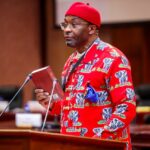Right from its inception on May 29, 1999, the Constitution of the Federal Republic of Nigeria 1999, has been bedeviled by problems and controversies. Many Nigerians consider the 1999 Constitution as military-driven and that the reference to ‘We the people’ in the constitution does not truly represent them.
Even with the amendment of the constitution, little or no effort has been made towards tackling the problems.
- FG’s N895bn supplementary budget to get expeditious passage — Lawan
- Ondo doctors begin two weeks warning strike
Several of Nigeria’s challenges are attributed to perceived imbalances and inadequacies of the constitution. Attempts to amend the constitution to really address the imbalances have proved abortive.
The strength of democracy is predicated on decision of leaders mirroring the voice and demand of citizens.
While the 1999 Constitution fails to define the roles of the traditional rulers in government, it also places too much powers in the executive. This makes the executive to abuse the office and disregard the powers of the other organs. The exclusive list is too wide. It makes the federal government to be too dominant, while the states and local governments become unnecessarily dependent on the centre.
If the problems with the constitution are not tackled, then abolishing the constitution and coming up with a new one will not only bring about development but also appease the citizens.
Blessing Felix, Department of Mass Communication, University of Maiduguri.
 Join Daily Trust WhatsApp Community For Quick Access To News and Happenings Around You.
Join Daily Trust WhatsApp Community For Quick Access To News and Happenings Around You.


